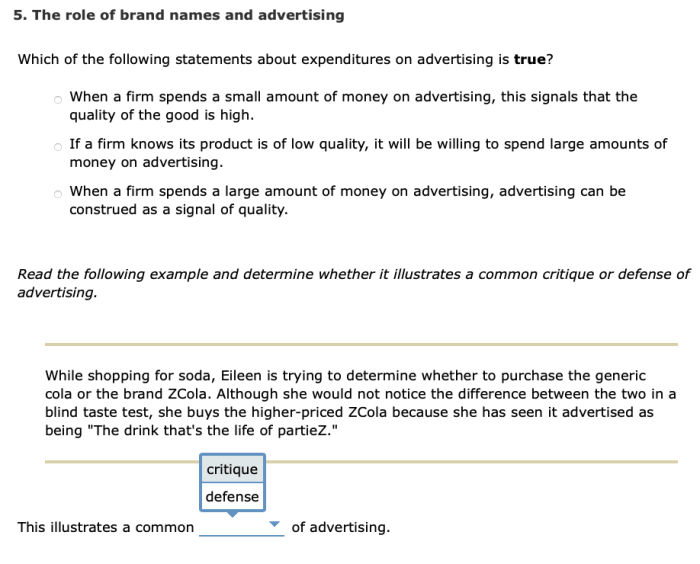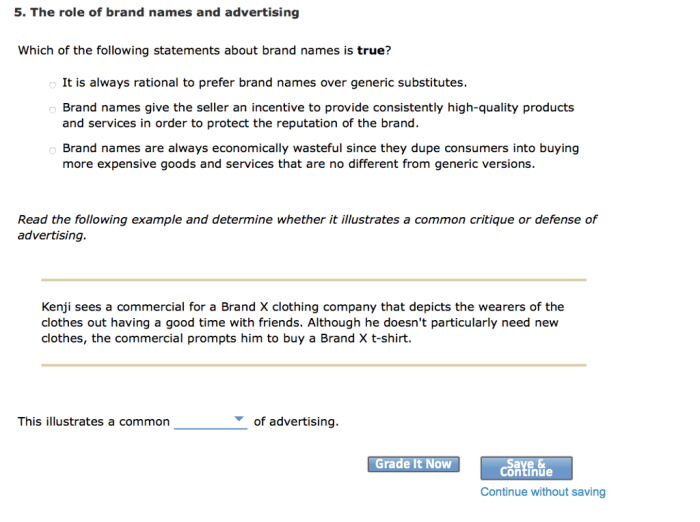Which of the following statements about brand names is true? This question takes center stage as we delve into the captivating realm of brand naming, exploring its profound impact on consumer recognition, product differentiation, brand equity, marketing strategies, legal protection, globalization, and evolving consumer trends.
This comprehensive examination promises a journey of enlightenment, empowering readers with a nuanced understanding of the intricacies and significance of brand names.
Brand Names and Consumer Recognition: Which Of The Following Statements About Brand Names Is True

Brand names play a pivotal role in enhancing consumer recognition and recall. They serve as unique identifiers that differentiate products and services in the marketplace, making them easily recognizable by consumers. When a brand name is consistently presented across various marketing channels, it becomes ingrained in consumers’ minds, creating a strong association between the brand and its offerings.
Examples of well-known brand names that have achieved high levels of consumer recognition include Coca-Cola, Nike, Apple, and Amazon. These brands have established a strong presence in their respective industries and have become synonymous with quality, innovation, and reliability. The familiarity and trust associated with these brand names significantly influence consumer behavior, making them more likely to purchase products and services from these brands.
Brand Names and Product Differentiation, Which of the following statements about brand names is true
Brand names are essential for differentiating products from competitors in the marketplace. They convey unique product attributes and benefits, helping consumers make informed decisions about which products to purchase. A well-chosen brand name can effectively communicate the essence of a product, highlighting its key features and advantages.
For instance, the brand name “Tide” for laundry detergent instantly conveys the concept of cleanliness and freshness. Similarly, the brand name “Intel” for computer processors signifies speed, reliability, and innovation. These brand names effectively differentiate these products from their competitors and create a strong brand identity.
Brand Names and Brand Equity
Brand equity refers to the value and reputation associated with a brand name. It represents the intangible assets that contribute to a brand’s overall worth. Brand names play a crucial role in building and maintaining brand equity.
Strong brand names evoke positive associations and emotions in consumers’ minds, which translates into increased brand loyalty and willingness to pay a premium price. Examples of brands with strong brand equity include Rolex, Mercedes-Benz, and Louis Vuitton. These brands have carefully cultivated their brand names over time, creating a legacy of trust, quality, and exclusivity.
Brand Names and Marketing Strategies
Brand names are an integral part of marketing strategies. They provide a consistent and recognizable identity for a brand across all marketing channels, including advertising, packaging, social media, and online presence.
Maintaining consistency in brand name usage is crucial for building a strong brand identity. Consumers should be able to easily identify a brand’s products and services regardless of the channel they encounter them through. This consistency helps reinforce brand recognition and strengthens the brand’s overall impact.
Brand Names and Legal Protection
Brand names are valuable assets that require legal protection to prevent unauthorized use and infringement. Trademarking is the primary legal mechanism used to protect brand names. A trademark gives the owner exclusive rights to use the brand name in commerce, preventing others from using it without permission.
Brand name infringement occurs when a third party uses a brand name without authorization, causing confusion or damage to the original brand owner. Consequences of brand name infringement can include legal action, injunctions, and damages.
Brand Names and Globalization
In a global marketplace, brand names face challenges and opportunities. Brands must consider the cultural context of different markets and adapt their brand names accordingly.
For example, the brand name “Dove” for soap and personal care products is used globally. However, in some cultures, the name “Dove” has negative connotations. To address this, Unilever, the parent company of Dove, has adapted the brand name to “Rexona” in certain markets.
Brand Names and Consumer Trends
Brand names are constantly evolving to reflect current consumer trends. Social media and online reviews have significantly influenced brand name perception.
Consumers increasingly rely on social media and online reviews to gather information about brands and products. Positive or negative experiences shared on these platforms can impact brand reputation and influence consumer decision-making.
FAQ Insights
What is the primary function of a brand name?
To enhance consumer recognition and recall, differentiating products from competitors, and building brand equity.
How do brand names contribute to brand equity?
By establishing a unique identity, conveying product attributes and benefits, and fostering customer loyalty.
What are the legal protections available for brand names?
Trademarks, copyrights, and patents provide legal protection against unauthorized use or infringement.

